Jan Carson's Blog, page 9
July 22, 2017
Wonderful, Wonderful West Cork
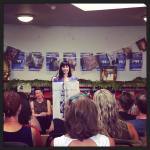


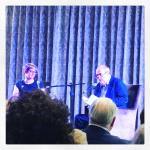


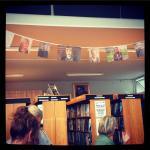
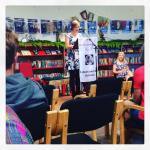




I’m going to be honest here. I love a literary festival. Bookish people. Good conversations. A chance to fangirl over rarely seen in public writers, (George Saunders, George Saunders, George Saunders). Tote bags and talk of tote bags. Spending all your hard-earned cash in the festival book store and then not being able to lift your cabin bag into the locker on the Easyjet flight home. Free wine. Not free wine. Presence of Peggy Hughes, (book festival to PH ratio is currently running at approximately one Peggy Hughes sighting for every three literary events in the UK, and surely this is no bad thing). The opportunity to catch up with old friends. The chance to meet new friends. A wee ice cream consumed in the street. I’m easily pleased. So long as all the above are met in some measure, I will basically sleep in the back of my car, run on salt and vinegar Hunky Dory’s for six days straight and call the experience a tremendous success. I’ve lost track of how many book festivals I’ve been to this year. It’s somewhere in the dozens. It feels like it’s in the hundreds. (I have at least a hundred tiny little bottles of thieved hotel shampoo which bear witness to my bookish travels). However, in the middle of all the book festivals, West Cork Literary Festival stands out as a beacon of all that is best and most special about book festivaling and I am extremely grateful to have spent a wee week there, hosted by Eimear, her wonderful staff team and the, (occasionally quite odd but), thoroughly warm and welcoming people of Bantry. Here are my highlights.*


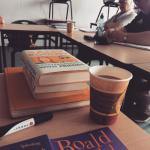

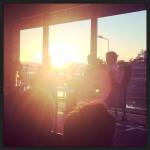

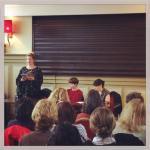
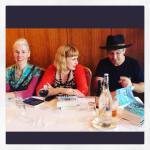

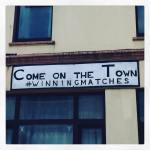
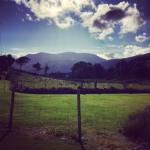

Scenery, scenery, scenery– I have never been in West Cork before. Why have I never been in West Cork before? Driving round West Cork is like being repeatedly punched in the face by beauty. Boom – it’s an enormous mountain. Boom – it’s the most gorgeous little cove. Boom – it’s a big field of picturesque, standing cows contemplating the heather. My eyes are actually tired from looking at beautiful things. I may well have to spend the week contemplating Castlecourt multi-storey until I recover.
Great readings – Sarah Perry was my favourite, (mostly because I have never heard her read before and she was just as excellent as I’d imagine in my head and the Essex Serpent is completely wonderful), but I also particularly enjoyed hearing Lisa McInerney, Sara Baume, Sarah Moss and Doireann Ni Ghriofa, who were all stellar.
Catching up with old friends – ’twas great to spend time, (mostly in pubs), talking and talking and talking to people I truly love but only get to see at book festivals. If nothing else this summer has led me to believe that book festivals are basically just summer camp for writers and this is probably no bad thing. There should be much more getting together to talk in pubs organised for writers. The Arts Council should probably fund this.
Meeting new people – I met some wonderful people at West Cork Literary Festival this year: Hild and Od from Norway, the Irish language poet Doireann Ni Ghriofa, Maggie Smith, (the lovely, American poet rather than the actor), Vona Groarke and two very chatty nuns. It would have been worth the six hour drive just to meet the chatty nuns but the other folks were also great acquaintances to make.
Hotel: It is nice to be put up in a hotel. I am often put up in a hotel. As long as it has a bed and no coffee table in the middle of the bathroom I am usually pretty happy. If it has little bottles of shampoo and a working hairdryer I’m delighted. If it has eggs benedicte on the breakfast menu, I am generally ecstatic. West Cork Literary Festival put me up in a suite. Three rooms. Only one of me. And I had a toaster. I bet Hilary Mantel doesn’t even get a toaster in her room when she travels. What a treat.
Jacuzzi afternoons– when attending literary festivals of three days or more it can begin to feel a little like you are running a marathon with your mouth. It’s not so much the public readings which tire you out, as all the chatting and socialising and constantly having to explain the DUP coalition as soon as people hear your Northern Irish accent. I have now discovered that the antidote to marathon mouth/brain/body is half an hour sitting in the jacuzzi every afternoon. It does help if the hotel has a jacuzzi. Half an hour sitting in reception probably wouldn’t be as relaxing.
Workshops – I had six people in my introduction to the short story class for three hours every day across five days. Normally at the end of such a series of classes I would email/text/phone Hils and say, “that workshop would have been wonderful if it wasn’t for this one person.” There was no “this one person” in my workshop this week. They were all delightful, talented and very encouraging. I suspect that I lucked out.
Readings – I got to read with Mike McCormack and Mia Gallagher. Being on stage with a man in an Indiana Jones hat and a strikingly beautiful woman with a killer reading voice, instantly makes you feel like you are in an indie band from the 90s who have aged quite well and are still making really good music twenty years after their initial rise to fame. It was a delight to talk David Lynch, Brexit and Bon Jovi with the two of them and be so expertly chaired by Sasha de Buyl-Pisco.
So and So and So – everyone in West Cork says so after everything. “There’s your pint, so.” “Your rooms just on the second floor, so.” “I’ll be back in a minute, so.” It is brilliant. It is like encountering Donal Ryan everywhere you turn.
Bunting of your own face – you quite literally haven’t lived until you’ve seen bunting of your own face strung across the outside of a library or the window of a ladies’ dress shop. Perhaps this might work as an alternative to the usual street dressing in East Belfast next Twelfth season.
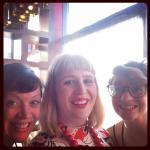
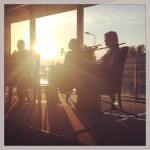

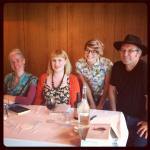


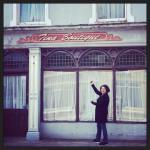






*Apologies for the fact that all my blogs seem to have descended into ten point lists these days. If I was going to make an excuse it would involve time constraints, tiredness and something about book editing sucking all the imagination out of me, but in all honesty I just really love making lists.



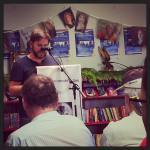

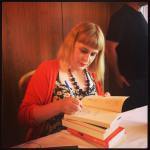
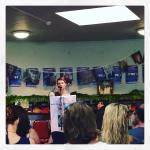
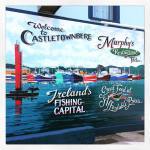

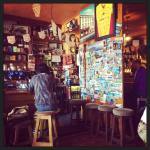
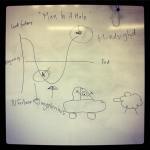
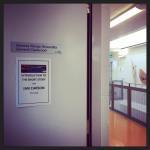



June 25, 2017
ILS Norwich 2017
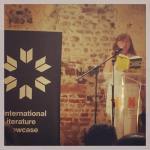
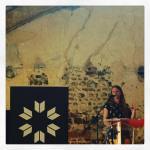
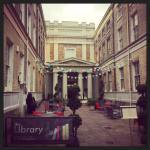
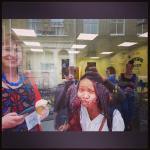
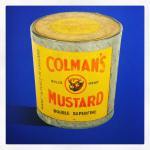
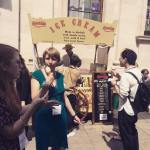
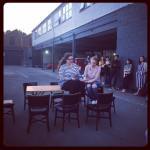


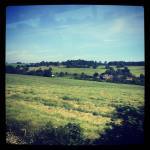
Today is the first day in 26 consecutive days where I have not been at a literary event. Tonight is the first night in 15 nights where I have not ended up in the pub talking about bookish things, (“How great is Sally Rooney?” “Aren’t book festival tote bags so much better if they have a gusset?” “The semi-colon, just an indicator of a particularly long pause, or a slightly more complex grammatical concept?”) As a result I look and feel like a used tea bag. I have spent the day sleeping, eating vegetables and doing three loads of almost entirely black laundry, (note to self, must start experimenting with more brightly coloured on-stage outfits). Am going to write a very quick blog about how amazingly wonderful the ILS was and then mainstream three weeks of missed Casualty and Holby episodes and pretend I do not have a book to edit because I think I might have reached maximum literary capacity. (Who am I kidding? There’s no such thing).
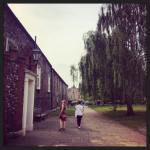
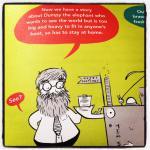
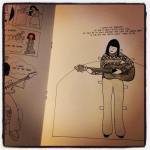
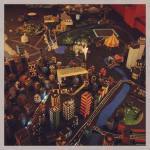
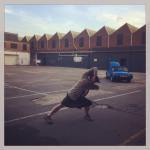
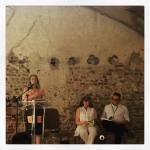
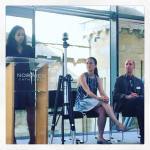
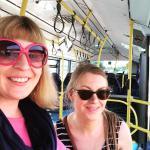
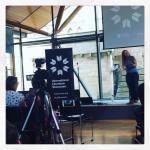

Norwich is probably not the first destination which springs to mind when you think of super places to mini-break. Granted, it is the home of Alan Partridge and it does have the Colman’s Mustard Museum, (probably the world’s most popular mustard-based tourist attraction), but it’s really just one step up from Ipswich AND is also located in the most awkward-to-get-at-from-Belfast spot in the whole of the British Isles. (On Monday it took almost 12 hours to get from Ballymena to Norwich train station, a timeframe usually more representative of transatlantic -or even space- travel, and made even more unbearable by the 3 hours and 10 minutes spent stuck outside Stratford train station in a boiling hot Greater Anglia train, being placated with lukewarm, bottled water whilst an angry woman stripped down to her underwear and tried to provoke a riot. Gah). However, in retrospect the last five days have been so incredibly, inspiringly brilliant, I’m starting to wonder if the summer might have peaked too soon. And, in Norwich of all places.
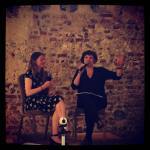
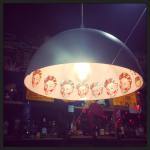
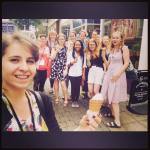

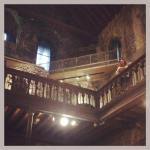

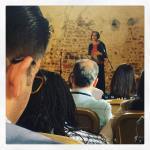


I’m not sure I can succinctly summarise what we’ve all been up to for the last week. Suffice to say there were about 100 people who live, breathe and occasionally birth books, all thrown together in a series of medieval buildings, reading, eating, drinking and, most importantly, talking about why words are important and how they can change the world. Much ice cream was eaten. Many drinks were downed. Everyone present sweated through every item of clothing they’d packed and, by the end of the week, were somewhat ripe and mostly recycling the previous day’s outfit. Good ideas collided with other even better ideas and birthed collaborations which are, even now, beginning to ricochet backwards and forwards across the planet, (did I mention there were people there from pretty much every corner of the globe?) We lived in each others’ pockets for an entire week and, leaving to make our lonesome ways back to the various corners we’d come from, wondered why the train/plane/taxi back felt so much quieter than it had on the way to Norwich.
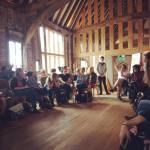

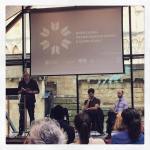
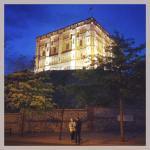
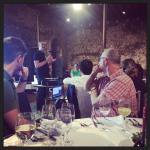

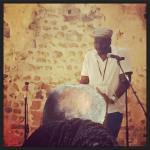


What an incredible week. So many ideas. So many good thoughts to mull over in the weeks to come. So many brilliant new friends to conspire and plot with, and wasn’t it particularly heartening to bump into the Canadian/New Zealand/South African/Turkish/Scottish versions of myself, as if it should be surprising to find there are bookish thirty something women all over the world, furiously programming literary happenings with cake and gin and tireless good humour, and that I should get on with these ‘other mes’ like an absolute house on fire. I am grateful to have been in Norwich this week. Grateful for the opportunities the ILS might present in the future, and grateful to have had the chance to sharpen my own creativity off so many incredible talented individuals. But, I have to say the best part of the week was the realisation that very few of us are ‘just writers.’ We are festival programmers and outreach workers, facilitators and academics, activists and community growers. People who care about important stuff and are actually doing their best to provoke change. And yes, writing doesn’t pay and this economic climate is forcing us into juggling jobs and writing, and don’t we all occasional fantasise about sitting in a garret writing all day? But, I truly believe you lot are the sort of people who couldn’t content yourself with ‘just’ writing.
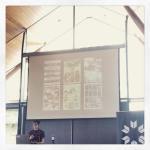
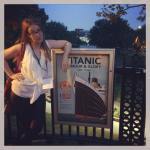
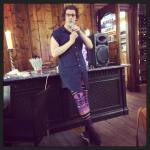

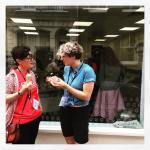
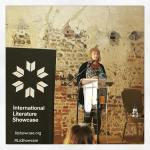

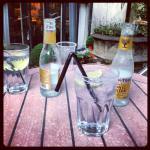

I listened very carefully to you all this week. I listened to what you said on stage and what you said over cake and beer and morning coffee. I listened to what you said very late at night when there had been tremendous amounts of wine consumed. You’re all, without exception, bloody marvellous writers. You don’t need me to tell you that. Between you, you’ve got an armoury of literary accolades which would make Hilary Mantel feel inadequate. I know you can work wonders with words. I was much more interested in how you talked about words creating community, and words provoking social change, and words celebrating diversity, fostering inclusivity, offering dignity, and basically, making a significant impact on whatever broken, under-funded, potentially beautiful little corner of the world you’ve found yourself calling home. And I was most heartened to see the room full of writers and bookish people who have not yet become worn down. Who aren’t content to just write and leave it at that. Who actually believe that what they say, and how they say it, can make a difference. There was very little talk of defeat this week. I liked that a lot. Am back home with fire in my belly, and the beginnings of a head cold, and a unsquashable desire to keep pressing on. Thank you all. It was great to be among such good souls
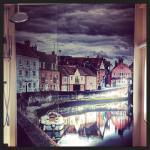
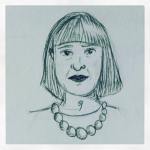

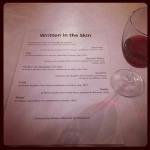
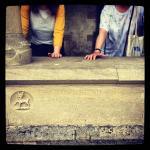

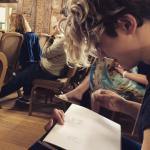
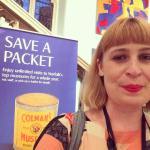
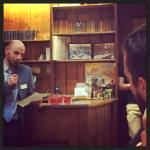
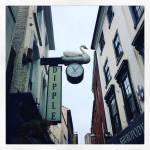
.


June 18, 2017
Belfast Book Festival 2017
[image error]
Belfast Book Festival is over for another year. It’s been a roller coaster of an 11 days. I’ve got bags beneath my eyes, an almost gone voice and a whole pile of new books I really didn’t mean to purchase. I’ve also met some great people I didn’t know before, (Lisa Harding, June Caldwell, Nuala O’Connor and a host of lovely and very enthusiastic older ladies who I haven’t a hope of remembering by name). I’ve heard some amazing writing, consumed half a pound of smelly cheese from the Green Room, stolen some biros, and become adept at sneaking out the Crescent’s fire exit when there’s somebody I want to avoid at reception.
I want to salute Keith, Pete, Gail and team for running a tight ship through out, yet always taking the time to make people feel welcome and included. This year’s Book Festival has managed to toe the line between quality art and inclusivity, and that’s no small accomplishment in a festival so jam-packed with events and writers. They also successfully executed the move from forwards to sideways set up in the studio. Change comes slowly in Belfast and, whilst everyone was a little shocked by this controversial departure from form at the beginning of the week, by the festival’s end, it was hard to imagine the stage at any other place in the room.
I always come away from Book Festival week enthused about books and writing, but also freshly in awe of our literary community here in Belfast. We may not have the budget of Hay or the bigness of Edinburgh or a fancy stately home like Boris, but it always makes me happy to hear visiting writers and first time audience members say how welcome they felt at the Belfast Book Festival. We’re very good at being friendly Belfast. Let’s make welcome our thing. Thanks to the BBF Team for giving us a space to celebrate books and people and good conversation these last few weeks. I’m already looking forward to next year. But first, sleep.
Here are some snaps I took over the last week and some of my festival highlights.
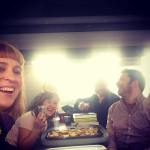
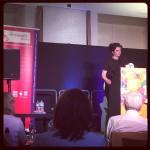
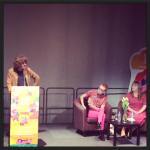
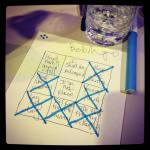
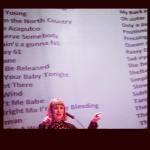
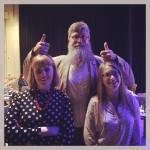
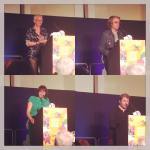
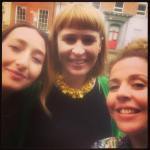
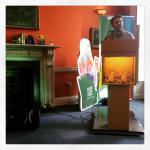
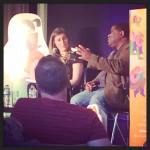
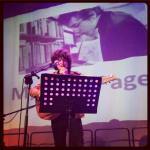
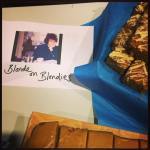
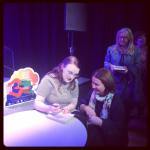
Bob Dylan Bingo – the world has clearly been waiting for a way of combining Bingo with Dylan obsession. We gave Bob Dylan Bingo to the world this week and the world was exceedingly happy, (especially the man and woman who’d been waiting all night to hear Must Be Santa).
So many friends with pamphlets – Zosia, Padraig, Olive, Paul, Susannah thank you for giving us your wonderful poetry. Perhaps next year you could spread your incredible talent out a little so I do not spend my entire eating budget for the week on poetry. This is the reason why I have eaten so much blue cheese from the Green Room.
So many friends with pamphlets (2)– Look at you all doing wee sideways poems. Is this a thing now? How do you know when a poem will be well-served with the traditional portrait setting and when you’ll have to flip the page 90 degrees and go for landscape? Is the name for this a sidey? Have you considered diagonal poems?
The Green Room – This year’s Green Room was extremely classy and contained a selection of refrigerated cheeses, Tunnock’s Tea Cakes, (sacked and pillaged pretty early on by myself and Lisa McInerney), and a pretty rocking mix of 1980s classics. Well done Green Room coordinator.
Mr. Tangerine Flan – I think Hilary Copeland might have reached the peak of cake-based punnery with this bad boy. AND it was delicious. AND it was gluten-free.
Sinead Morrissey– Friday night saw Sinead deliver her last reading in Belfast before she moves to Newcastle. It goes without saying that the reading was marvellous and all the emotions were in the room but it was particularly brilliant that the final poem she read was “Whitelessness,” because it is my favourite, and I had been playing Sinead Morrissey bingo in my head all night, hoping she’d read this one. (Me = winner. Me = also loser, on account of it being Sinead’s last poem).
Oisin Fagan’s jumper – imagine what a rainbow would look like if you put in a blender. Then imagine what that mixture might look like if fashioned into a nice sweater. Then imagine how awesome that jumper would be if it was made of shiny, skin tight spandex. Stop imagining. This jumper is real. It was attached to the torso of Oisin Fagan during our panel on the short story. It was actually louder than the combined loudness of myself, Oisin, Nuala O’Connor and June Caldwell. This is something of an achievement.
Chats with Keith – It is always good to chat with Keith. It is like watching the One Show – entertaining and every so often a little bit educational. This week Keith taught me about writing operas and politics and how you can get spontaneously pregnant if you are caught up in a bomb blast. He also passed me off as the host of a crime fiction panel and left me stranded and confused with a lovely, lady crime writer. As I said, both entertaining and educational.
Philip Ardragh– You’d have to be a very grumpy person not to love Philip Ardragh. He has the sort of voice which makes children laugh and small dogs bark incessantly. He is about seven foot tall and massively bearded. If you are really tired after running three events back to back he will gather up all your felt tips and put them in order. We should probably have Philip Ardragh at the Book Festival every year from now on.
Bad vegetarians – last year everyone was giving up smoking. This year everyone was giving up vegetarianism. Mostly the poets.

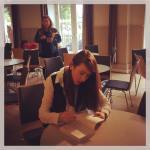
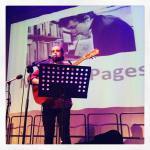
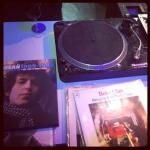
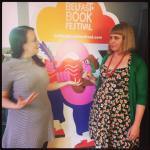
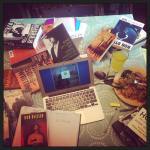
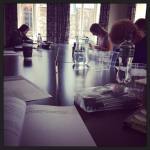
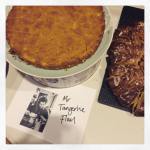
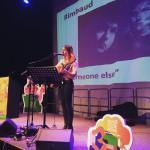
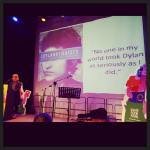
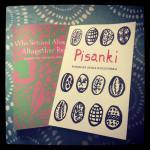
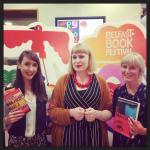
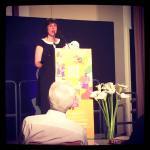
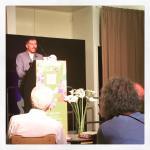


June 12, 2017
Writing for Radio
[image error]
I’ve never written for radio before. I am a short story writer and novelist. I spend most of my days in coffee shops, headphones on, ignoring the world around me as I hack away at my next story. When I get to perform my work it’s almost always just me, up there behind the microphone, knees knocking as I try to do my writing justice. Writing is often a lonely game but at least I only have myself to blame when a piece works or falls flat on its face. I’ve been writing for about fifteen years now. In the last few years I’ve been particularly drawn to collaborative projects: working with other writers, with musicians and theatre makers to produce something new and intriguing together. Though each experience has had its challenges, (creative clashes, last minute deadlines, general chaos), I’ve found the opportunity to create with other people an absolutely liberating and inspiring process. When I saw the call to pitch for a monologue piece for World Music Day appear on the BBC Writers’ Room website I was a little daunted, but I thought it might be a new challenge in the best sense. I was excited about the possibility of working, well outside my comfort zone, with a team of other creatives.
Writing for radio has proven to be an incredibly collaborative experience. From the very outset this was a group project. We met with other shortlisted writers in London to bounce ideas around and think about how our themes could be realised within the context of a radio piece. I didn’t know anything about formatting for radio, but there was plenty of good advice available and I never felt overwhelmed by all the new techniques I was learning. Once selected I worked closely with Justine, Keith, Usman and the fabulous team at the BBC Writers’ Room to develop my script, tweak issues and select the correct pieces of music in order to best enhance the story line. I also took advice from musicians and friends who listened to me reading the piece and offered critique and suggestions, honing the monologue over a period of six weeks until we were completely happy with the final result.
I’ve been working in literature for a long time and I’m no stranger to the editing process. It can be painful and frustrating. However, it was a joy to work with Justine and her team. All critique was offered alongside incredibly generous encouragement and I’ve felt fully supported throughout the whole process of getting my script from idea all the way through to airing. It’s also been great to feel the team are genuinely excited for you to have your piece developed. There have been quite a few text messages and emails littered with exclamation marks flying backwards and forwards across the pond as we’ve celebrated every little step of the development process. As collaborative experiences go, writing my first radio piece has felt like exactly the right mix of maintaining artistic control and also enjoying the benefits of being part of a super creative, enthusiastic team of people who are passionate about making great radio.
Perhaps, the most exciting part of the journey over the last few months was the moment I discovered that Liam Neeson had agreed to read my monologue. Liam is from the same small town in Northern Ireland as me. I’ve long been an admirer of his work and I’m still reeling that he actually agreed to record my piece. It’s an incredible boost for my artistic career and it feels particularly special to be supported by an artist who’s emerged from a similar background, to achieve incredible and deserved success in his career. I don’t know how Justine managed to pull this one off but she’s clearly a miracle-maker and I am incredibly grateful for all her hard work and appreciate how lucky I am to have been given such a great opportunity.
I’m also particularly delighted to have an actor of Liam Neeson’s caliber voice my monologue because the piece engages with such an important, and often ignored topic. My monologue focuses on a concert pianist who has developed Dementia as he attempts, and ultimately struggles, to play a piece by Ravel. Over the last six years I have spent a lot of time working in the arena of arts development for older people, particularly those living with Dementia. I often see how frustrating life can be for people as they face limitations and restrictions on performing tasks which might have seemed simple before diagnosis. The composer Ravel actually suffered from Aphasia, (a linguistic disorder often associated with Dementia), during the last years of his life and struggled to do his own work justice and this impacted our choice of music (Ravel’s Piano Concerto in G). I wanted to honestly reflect the struggles, the triumphs and the incredible dignity of many of the people I work with in this piece and it is an incredible honour, and hopefully a small gift to them, to have the monologue so significantly featured on Radio 3 and read by such a well-loved voice. Thank you BBC Writers’ Room for taking a risk on new writing and new writers. Opportunities like this are the stuff of dreams.
(This piece will be airing on BBC Radio 3 on Thursday 15th June 2017 as part of BBC’s Music Day and will be available on IPlayer for approximately a month).


June 1, 2017
Postcard Stories Launch – A Few Photos
What an amazing evening the Postcard Stories launch was. Hannah McPhillimy was in fine voice as usual, Paul Maddern gave the most incredible Sound of Music themed intro and the Strand was bunged with pretty much all the best and most wonderful people in Belfast. There are too many people to say thank you to individually but I hope you all know how happy it made me to celebrate a new book in the presence of so many people who have supported, encouraged and championed me over the years. Here are a few photos of a really lovely evening. (Apologies to all the people I thieved them from).
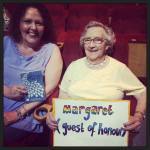
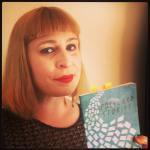
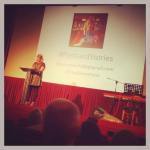
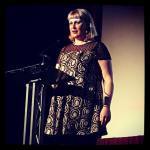
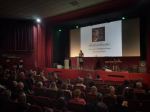

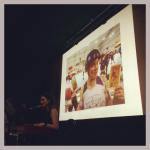
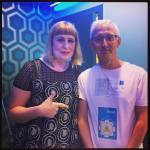
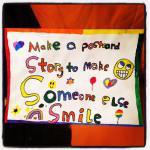

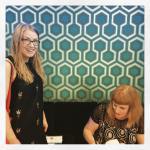
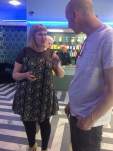

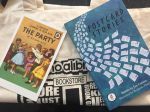
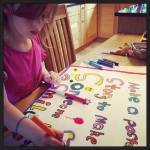
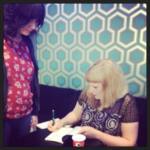
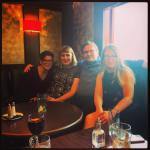
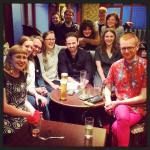
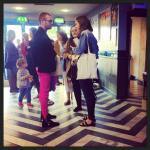
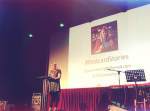
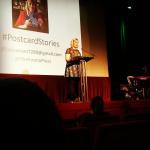
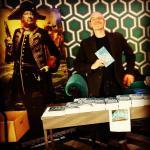
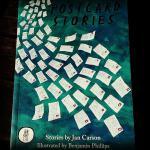
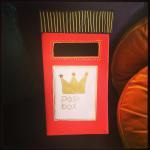
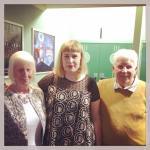

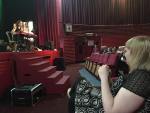

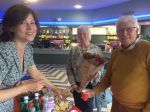


May 30, 2017
Postcard Stories Launch
[image error]
Three years ago when I launched my first book, Malcolm Orange Disappears, I had the whole night organised to within an inch of its life. I had little bags containing everything I’d need for each facet of the launch packed days in advance. Maybe I was worried that the book launch would begin prematurely. Probably I was just being anal. I had a bespoke playlist prepared on my iPad, (which then proceeded to disappear at the launch and stay disappeared for almost two years before reappearing at the bottom of one of my extremely organised launch material bags, which I was only getting round to unpacking two years later- there’s definitely a life lesson in there somewhere). I had thank you cards for everyone and colour themes and the sort of detail most people don’t even get round to putting into their wedding. I spent the day of the launch at the hairdressers and having lunch in a fancy restaurant. I sucked the life out of every second of that day, mostly because I thought I might only get one chance at having a book launch.
[image error]
Tonight is the launch for my third book, Postcard Stories. I will not spend the day in the hairdressers. I have not had time to even wash my hair yet. I am planning on spending the day as I always do: writing for a couple of hours, dealing with admin emergencies and preparation for upcoming events, tackling the mountain of yesterday’s dishes beginning to crust in the sink. If I am lucky I will have a shower AND take time to dry my hair with an actual hairdryer. If I am particularly lucky I might even get to go over my reading before I stand up to read. I spent last night making a midnight dash to 24 Hour Tesco for printer paper and a new ink cartridge for my signing pen. I am not particularly prepared, (bits of my attempts to be prepared are currently spread over five rooms and the back seat of my car). I am not having lunch in a fancy restaurant. There is no colour scheme for tonight, (though there are tiny shortbreads shaped like post vans). I have lost my iPod again so there won’t be a bespoke music mix, (sorry).
[image error]
Third books are like third babies. By this stage I know what to expect. I know just how much work it takes to get the little buggers from conception through to safe delivery. I know it isn’t quite as glamorous or effortless as I initially thought it would be. It requires hard work, and many, many self-rallying pep talks, and a lot of actual sweat, (nobody told me how much physical hauling and carrying and dashing between one place and the next would be involved in writing books). Three books in and I finally have a vague idea of what is required of me. The initial terrifying thrill of being cast into the giddying unknown has kind of rubbed off. Which is not to say the third book is any less precious than the first. Every book is a different experience and every book is a kind of miracle. I’m still a little blown away by the fact that an idea can, over time, be translated into words and then an actual physical object which I can hold in my hands and line up on a book shelf and pass on to other people. Magic. Alchemy. Blood, sweat and tears; call it what you like, it’s still a kind of revelation. And there is still no feeling in the world quite like standing in a room full of your best and favourite people celebrating such a thing together. And, unlike my first book launch, I am now reasonably confident that if I work hard, and keep writing and surround myself with the sort of people who won’t let me give up, then this book won’t be my last and I’ll get to do this all over again next year or the year after.
[image error]


May 22, 2017
Things to Think About Whilst Moving 2,000 Books From One Side of a Small Room to the Other
[image error]
This weekend I did not have a weekend. Instead I mostly stayed in and put all 2,000 of my books in alphabetical order. I thought this would be fun. I thought this would take around three hours and the rest of the weekend would be mine. This was not fun. This took a total of approximately nine and a half hours. This meant that I did not get to watch Casualty of a Saturday night, and did not eat dinner on Sunday ’til almost midnight and, in lieu of a normal, functioning lower back, now have what feels like a pointy foot kicking me repeatedly in the spine, (and yes, before you ask, I did bend with my legs, but there’s only so many times you can bend with your legs before they pack in and you have to forget everything you learnt in Belfast City Council’s Manual Handling for Office Workers’ Introductory Training and bend with whatever bit of you has retained some modicum of flexibility).
[image error]
I am pleased to announce that all my books are now in alphabetical order within genre, (fiction, non-fiction, music journalism, theology, poetry, travel, plays, literary criticism, graphic novels, recipe books and books so bloody enormous they will only fit into that one weirdly, deep shelf you are left with in every Ikea Billy bookshelf). They are so perfect and pretty I am never going to read any of them ever again for fear of upsetting my bookshelf equilibrium. I am also fighting the almost irresistible desire to shout, “George Orwell,” or Moby Dick or, The Beginner’s Guide to Screenplay Writing, and then move to the spot where this particular book is located with such speed and ease of access, I will no longer regret wasting a whole weekend up to my ears in dog-eared paperbacks. I am currently thinking about buying some of those library ladders on wheels and going to bed for a fortnight and certainly never buying any books ever again because they are already all here in my house, looking smug. Here are some other thoughts I had whilst carting many, many books from one end of the living room to the other for a back-breakingly long time.

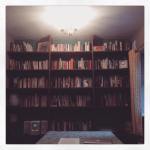
Perhaps this could be a new form of exercise aimed at librarians and people who work in books stores. It would involve bending and squatting with huge handfuls of heavy weights, much like kettle bells only with The Goldfinch in hardback and Sylvia Plath’s Complete Diaries balanced in either hand. It would be good for your thighs but the books might get sweaty.
How could I possibly have lost American Gods again? That’s three times now I’ve bought it and three times it’s disappeared. Neil Gaiman must have it tied to him with a giant piece of elastic. Damn you Neil Gaiman.
How have I acquired three copies of Jonathan Lethem’s Dissident Gardens? I do not even really like Jonathan Lethem, AND I heard Dissident Gardens on “Book at Bedtime” and remember thinking it sounded particularly dull, and yet here I am with two paperback versions, and a hard back.
Wine will probably help with the process of sorting all these books.
Wine did not help with the process of sorting all these books.
I have forty one books about Bob Dylan. I probably know more about Bob Dylan than Bob Dylan does. Why does anyone need forty one books about Bob Dylan?
Publishers should stop making oddly shaped high and wide and impossible to stack books. They only fit on the shelf sideways and upset the flow of the shelf which then makes me already disposed to dislike the actual reading experience.
After ten years, and carting the stupid thing all the way from the West Coast of America in my hand luggage, I am finally ok with throwing out the collected short stories of Ernest Hemingway because there are 75 crucial pages missing from the middle of it and many of the stories do not make sense and I do not like Ernest Hemingway. (Apart from The Old Man and the Sea, and certain parts of A Moveable Feast).
It is interesting to think about the various writers thrown up against each other as a result of the alphabetising process. Whilst I have no doubt that CS Lewis, Anne Lamott and Madeleine L’Engle are having all the holy banter, I struggle to imagine what Faulkner is saying to Helen Fielding.
I now fully understand that bit in the Bible about the shepherd noticing one sheep out of a hundred is missing. Some chancer’s got my copy of Junot Diaz’s first short story collection and, even in a pile of two thousand other books, I still instantly noticed it was missing.
So many Francois Sagan novels. Why? Maybe I liked the covers. The covers are pretty cool.
Once again, at what point in my life did I acquire a personally signed copy of Simon Armitage’s Kid? (The book, rather than his actual child). I have never met Simon Armitage. Where did this book come from? How did he know my name?
C is a surprisingly popular letter when it comes to authors I particularly enjoy. F, not so much. Obviously M and S.
in regards to Arthur Conan Doyle, is Conan his middle name, (as in Conan the Barbarian), or his first surname, (as in Conan the American chat show host)? This is crucial information when it comes to deciding where to file Sherlock Holmes. F. Scott Fitzgerald and Gabriel Garcia Marquez are equally problematic, also your man who wrote Infinite Jest, which is also problematic in its own way.
A Million Little Pieces: to file in fiction, non-fiction or the recycling bin?
[image error]


May 15, 2017
In Awe of Moderately Successful Writers
[image error]
This week has been reasonably monumental. The new book has arrived and, thanks to Benjamin Phillipps stunning illustrations and the snazzy, cherry red inlay papers, it looks pretty epic. I can’t wait to start reading from it. On Monday, I got to visit Antrim Primary and write some Postcard Stories with the Primary Fours. It’s always good to spend a few hours with a bunch of eight year olds and remember what unfettered imagination looks like, (in this case, stories about “baldy-making hats” and magic villages, thieving pigeons and “Alien Babbies’). Then, on Thursday evening I caught the train down to Dublin to hear Bob Dylan in concert. Despite the moany eejits on either side of me, this was a thoroughly enjoyable experience, (Dylan live can sometimes feel more like a test of endurance). Bob was on tremendous form, his voice sounded fantastic, and he actually seemed younger than the last time I saw him about three years ago. Finally, at the end of the week, I hopped over to Scotland for a fabulous woman’s writing festival at the Glasgow Women’s Library and a couple of days in non-stop conversation with Peggy Hughes and Colin Fraser, up in Dundee. It’s been hectic. It’s been wonderful and I’m beginning a new week with a head full of ideas and the sort of buzzy feeling I always get just before I have to start writing something new.
[image error]
I’ve been thinking, (and talking), a lot this last week about artistic freedom. I’ve had brilliant chats with Peggy and Colin, Zoe Venditozzi, Stephen Sexton, (on the last bus back from Bob Dylan), and pretty much everyone else unfortunate enough to stumble into my thought path, about what it means to keep creative boredom in check and maintain an interest in your own work throughout your writing life. On Saturday Val McDermid brought the event at the Glasgow Women’s Library to a close with a challenge to remain curious even after a long career in literature. It was pretty obvious from the way she talked, with unchecked enthusiasm, about things she’s still learning and becoming interested in, that even after dozens of books, she’s still growing as a writer. The same goes for Dylan. Lately, he’s been rediscovering old American standards, collaborating with incredible session musicians, and reworking his own back catalogue in a manner which occasionally infuriates those, (in my opinion), Philistines who just want to hear Blowin’ in the Wind “done the way he done it back in the 60s”, but ultimately shows he’s still developing as an artist, even at the tail end of his career.
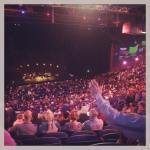
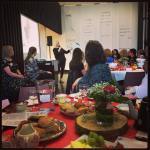
I’ve also heard a number of horror stories about writer friends, constrained by the demands of contracts and expectations, who’ve felt forced to write books and stories which grate against the direction of their current interest simply because of an assumption that this is what their established readership wants to read. I’ve been thinking about writers who, because of the eclectic nature of their output -Michel Faber and Brian Moore being the first who come to mind- possibly haven’t achieved the success or sales they could have if they’d stuck to writing sci-fi, or historical fiction, or thrillers, and thus built up a fan base and reputation as a certain kind of writer. I particularly enjoy Moore and Faber’s work because I resonate with the width of their artistic curiosity; (why not write about Catholic guilt one year and disappearing Victorian memorabilia a few year’s later, if this is what piques your interest?) I’m beginning to realise my own creative curiosity is a flighty creature, not content to be pigeon-holed into one particular genre or area of interest. I don’t think I want to be just a magic realist, or just a writer who explores the contemporary Protestant experience in Northern Ireland, or even, just a writer of prose. I’ve thoroughly enjoyed dabbling in radio drama recently. I might write an opera next year. I’m considering an idea I have for a children’s book. I don’t think I could settle for writing variations on the same book for the next fifty years.
[image error]
What does this mean? I’m not too sure. I just know I’d be absolutely miserable if I was constrained by contracts or reader’s expectations to write books which no longer excited me. I love the idea of having the freedom to be able to follow creative whims and learn from the process of research and development, regardless of whether the end product is successful or not. Which makes me wonder whether I want to be a moderately successful writer after all. (This has, until very recently been my aim). I’m beginning to understand that when you are a writer who no one really knows, with limited success, (I’m talking literary prizes and book sales here, rather than the sort of artistic satisfaction which I actually count as success), you have an awful lot more freedom to write what you want and dive, with reckless abandon, down whatever wee rabbit holes intrigue you. Ironically, when you get to the stage of being as madly successful as Dylan, or say, Neil Gaiman, or Radiohead, you can just do whatever you like artistically and whilst the haters will, to a certain extent, still hate, there will always be a level of interest in what you do, not to mention, an implied trust, (occasionally ill-founded nb. Dylan’s poorly conceived foray into visual art), that your new creative direction will be of worth simply because you are an artist of proven worth.
[image error]
It’s the artists in the middle who seem most squeezed, those moderately successful writers who appear to be a little constrained by their own success. There’s a pressure to deliver something similar, but better, than your previous book. There’s an expectation that you will be able to stretch the laws of time and space to enable you to simultaneously promote your current book, through articles and appearances, whilst also churning out 100,000 words of brand new, pure gold, literature. There’s the, always present, itch of fearing you are not the writer they think you are. I’m guessing it’s pretty hard to sit in this space and conceive of ideas and projects which will stimulate your own artistic curiosity, (eg. I think I’d like to do a travel book about Crazy Golf courses round the UK/write an opera about the Safari Park at Ballybogey/write a series of short stories based on Billy Joel’s “We Didn’t Start the Fire”*), without wondering how these projects will impact on your existing moderate success.
[image error]
I don’t really have answers to any of these musings. It’s very unlikely that I will move straight from the, “only people in East Belfast know who I am,” stage of being a writer, to the, “I am as famous as Radiohead,” stage of being a writer. (It is very unlikely that I, or any other writer on the planet, will ever move to the “I am as famous as Radiohead,” stage of being a writer). Maybe, I will someday be a moderately successful writer and not have to pay for my coffee in 5ps and not have to carry my own books to readings in a pull-on suitcase I borrowed from my dad, semi-permanently, in 2014, and this would be nice, but I am already starting to think about the constraints this could bring and how I might not get to collaborate with people I really like on projects which are not commercially viable. I am wondering if there is a way to creatively “put your foot down” now and say, I would always like to be the kind of writer who follows my imagination first and publishers/readers/market trends after. I don’t know. I’m not a moderately successful writer but I do think this it’s good to think about these things sooner rather than later. If nothing else, this sort of thinking is making me a lot more pro-active and executing the slightly crazy side projects and whims, while I still have time and wiggle room.
*All writing projects I fully intend to bring to fruition in the next five years.


May 6, 2017
Things I’m Learning (Albeit Rather Slowly) About Editing
[image error]
This week, (and last week, and the week before that, and pretty much every week for about two months), I’ve been working on editing my next novel. Editing doesn’t come easily to me. In every aspect of my life I am a, “conceive of an idea, enthuse about the idea and don’t really think about the logistics,” kind of person. I don’t like repetitive experiences; the gym and I, never really hit it off. I don’t like going over old ground; I used to absolutely hate revision when I was a student. Basically, I don’t like doing the same thing again when there are so many things I haven’t had a chance to do yet.
I particularly struggle when it comes to editing my writing. I tend to self-edit as I write. I’m not a rough drafter and always begin my writing day by reworking the material I wrote on the previous day. This means I can often get to the end of a short story and find I’ve already re-worked it a dozen or more times in the process of writing. I think this has fooled me into assuming I don’t actually need to edit my work. Am beginning to understand this is both untrue and rather arrogant. All books require editing and the novel I’m working on at the minute is no exception. I’m struggling but persevering, currently on my fourth complete read-through and hoping to have a slightly-less-rough draft by the end of next week. Here are a few things I’ve learnt about editing in the last month.
You don’t get the same, “having to get over the blank page” hump with editing as you do with writing. Every time I sit down to write something new I have this moment of exhaustion/fear/apathy where I don’t want to be writing and I feel like I don’t have anything fresh to write about. Every time. It usually takes me about half an hour of procrastination and deleting every sentence/starting again, before I actually get into the rhythm of writing and stop being so conscious of myself. Editing is actually a lot less intimidating. The hard work is already done. You just have to keep turning up for the nipping and tucking and tweaking part. It is not scary. It is just boring.
There is no point in editing tired- I can occasionally write tired, tapping into that slightly inebriated, semi-lucid freedom, DBC Pierre talks about in his section on writing exhausted in Release The Bats. You can’t edit tired. You need to be sharp enough to pick up on what’s working and what’s jarring and this takes a clean, uncluttered mind and a lot of concentration. (Probably best to limit yourself to a couple of glasses of wine too).
(Leading on from Point 2), I’ve learnt that I can only edit in short bursts: an hour and a half is ideal, two hours maximum. After this my reading eye gets sloppy and I seem to be less-inclined to make changes. I’ve started noticing that the first section I edit in each session is littered with track changes which literally disappear as the chapter proceeds. I’m pretty sure the first section of everything I write is not consistently more ropey than the second session, so I’m guessing I must be an editor with a short concentration span. I’m finding that two shorter sessions of editing in a day is much better than one four hour, caffeine fuelled super session.
You need to not be yourself when you edit- I keep having to put a distance between myself and my manuscript as I edit. I’ve read it so many times now, I know what’s coming next. I’ve been forcing myself to stop editing as the person who wrote the book and try to assume the persona of a person who wants to read the book. George Saunders, ( may his name be ever praised), talks a lot about the difference between reading your manuscript as a writer, and reading it as a reader. The longer I work on editing without taking a break, the more I find myself slipping into second-guessing what comes next and skipping necessary edits.
Some brilliant advice stolen from Eimear McBride’s session at Cathedral Quarter Arts Festival last week, “cut out the bits you don’t remember.” This has really helped my editing this week. If you can’t remember writing it, it’s unlikely that your readers are going to find it particularly memorable. (nb did not know until last week that EMcB managed to trim The Lesser Bohemians down from 800 pages to a much more slimline 250-ish. I can only conclude from this piece of trivia that it is well-worth listening to any advice she gives on editing).
Be careful what you are reading whilst editing- Some people have suggested very helpful things to read whilst editing this particular novel. They have helped me develop my characters and also given me some new insights into making sure the plot flows, rather than trickles and then suddenly explodes like a badly written page turner. I also tried to read Iris Murdoch whilst editing and felt so utterly inadequate I almost gave up. It’s probably best to read either helpful secondary material, or books which are much shitter than yours whilst editing in order to save yourself from have a crisis of self-doubt.
Know when to stop editing- if you have changed a semicolon to a comma and back to a semicolon more than six times you are not editing you are only picking at a scab. Leave it be.
Am now stealing a fabulous piece of advice from Kevin Barry. I think he said this during the rather bizarre and profanity-laden reading of Beatlebone, which he gave right besides the children’s section in Waterstone’s Belfast last year: “write the book then you will know what you need to research and will not waste time researching pointless, (and probably distracting), things which are not necessary to your story.” Hooray for Kevin Barry, giving us writers another good reason to be lazy. I have used this piece of advice to good effect this month and am only now tying down the specific technical terms I need for the novel. This has saved me a lot of time, (although as it’s mostly about doctors and I spend a lot of time watching medical dramas, I do consider myself something of an expert in the field already).
Do not do your last minute research on Wikipedia, (throwback to 2014 when I misread the Wiki article on the American Civil War and sent a manuscript off with the Confederate and Union teams the wrong way round- quite embarrassing). However, it is completely acceptable to use the hive mind of social media to find out specific pieces of insider knowledge, e.g. “what do you call a doctor’s room in a GP surgery?” or, “where does the Albertbridge Road end?” or, “what age do babies start getting teeth at?”
Do not feel bad that you are not writing anything new if you are in the middle of editing. This would be crazy and very painful like trying to give birth and simultaneously conceive another child.


April 28, 2017
When Everything Sounds Brilliant And You Can’t Say No
[image error]
Week Two of being a freelance writer, events programmer, arts facilitator, general Jack-of-all-trades and I am already feeling a little overwhelmed. How, I keep asking myself, can I have cut 38 hours a week of desk job out of the equation and actually find myself busier than ever? I am not lying in my pit ’til midday. I am not watching endless episodes of Loose Women/Jeremy Kyle/Columbo and lying around the living room in my dressing gown, (I do not have a TV and there is no heat in the house ’til the gas man comes, so this isn’t even an option). I am not out living it up in the Park Avenue of an evening and yet I seem to be arising around 8 and getting to bed around 1 and working pretty much every hour God sends in between. And I am not achieving anything of substance.
I have written approximately 300 creative words. (200 if you count the 100 I copied and pasted from another story that “wasn’t working” in a different but similar way to how this particular story, “isn’t working”).
I have read less than I normally manage to read during my daily half hour of reading whilst shovelling caesar salad into me and trying to ignore everyone else in the staff canteen. (Nb in my defence I am trying to read Eimear McBride, Iris Murdoch and a pretty intense psychology book all at the same time so I may cut myself some slack on this front)
I am actually behind on my Holby watching.
I have not yet managed to alphabeticize all my books despite the fact that all two thousand of them have finally made the journey from my parents’ attic, up the M2, to East Belfast.
I feel as if my time is disappearing into some imperceivable black hole. Like I am not moving forwards, only circling round and round the large pile of cardboard boxes in the middle of my living room floor. Like I am already failing at being a successful freelance person. Is this a normal state to be in during my first month of self-employment? I thought I’d be much more efficient than this. I had business cards printed and everything.
I had a bit of a spiral at the Arts and Ageing Conference on Wednesday. It was a great conference. There were fantastic projects showcased and inspiring people every direction you looked, (plus the added bonus of Pat and Doreen from Tyneside with three live chickens in a cage), but I couldn’t seem to concentrate on anything. Every time I looked at my phone there were 3 more emails from people asking me do to things. All great things. Things I’d really like to do. And mostly for actual money. But, it still kind of felt like being caught under an avalanche that just kept coming and coming. I ended up skipping the last two sessions to talk, for an embarrassingly long time, to the poor man making the conference video. I’d never met this man before. He will probably be hoping he never bumps into me again for fear of being trapped behind a buffet table having to listen while I freak out about my inability to say no to any job in case I never got offered another job again, and my consequent fear of taking on so many jobs I will never again have a weekend off, or time to write a book, or even unpack all the books currently sitting in cardboard boxes in my living room. Poor man. The Arts Council does not pay him enough to spend his day filming vox pops and then, just when he thinks he’s wrapped up earlyish, have to deal with a crazed freelancer who doesn’t know what she is doing. (I will say he had very wise advice, as did Eimear McBride, last night in the pub. Just throwing that in there so it looks like I have celebrity life coaches circling round the edges of my life).
Upshot is I have realised two things need to change if I am going to survive to see the end of Freelance Life Week Three.
One: I will have to learn to say no a lot more. I will probably even have to say no to things that sound really interesting, and things where people might think I am not a nice and kindly person if I refuse to take their particularly project on, or even things where I could make lots of money. If I do not learn to say no I will never write any more books. I will never stop feeling like the Duracel bunny when its batteries are just about to run out and it has started going really slow, and I will never get to spend time with the people I love.
Two: I need to work out what it is I want to do. I am currently pursuing two careers simultaneously, (I’ll put the career where I become Northern Ireland’s leading expert on BBC medical dramas on the back burner for the time being). I’m starting to realise that I cannot throw all my energy into writing AND throw all my energy into doing incredibly fun and life-giving arts projects with older people. I could, if there were two of me, or even one real version of me, and a reasonably good replica robot. But there aren’t. So, I need to pick which thing to go Hell for leather at and which thing to continue doing where and when I can. This is super hard. Both things are my favourite. Both leave me buzzing with a sense of this is what I was put on the planet to do. Sometimes they cross over and this is the absolute best. Mostly they run parallel. I think I need to make a decision about which foot to lead with. It’s kind of like when Kylie Minogue was still in Neighbours and doing a wee bit of singing on the side and sort of thinking, “should I be a world-famous actor or a world famous-singer?”
I think I have to write but hopefully there will be lots of moments where I get to co-star in the old people crossed with magic realism equivalent of Moulin Rouge and dip a toe in both worlds at the same time.





